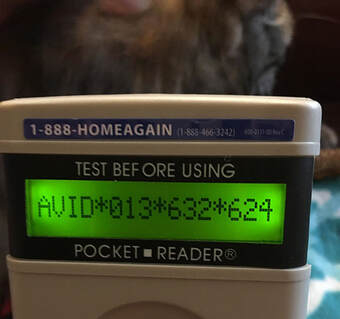
Millions of pets go missing each year. Unfortunately, very few of them are ever reunited with their owners. Many of them become and remain strays. Others are taken to pounds or shelters, where they are all too often, euthanized. The luckier ones are saved by rescue organizations and ultimately placed in adoptive homes.
But it doesn’t have to be this way. Lately, an increasing number of conscientious cat owners have sought a more permanent solution to this paw-tential source of sleeplessness and stress: micro-chipping.
It’s a simple and safe procedure. A veterinarian injects a microchip designed especially for animals -- the size of a grain of rice -- beneath the surface of your cat’s skin between the shoulder blades. Similar to a routine shot, it takes only a few seconds and most animals don’t seem to even feel the implantation. Unlike conventional plastic or metal ID tags, a microchip is permanent and, with no internal energy source, will last the life of your cat. Following the procedure, you must promptly register her with the microchip company (usually for a one-time fee), thus storing her unique, alpha-numeric code in their database.
Whenever a lost cat appears at a shelter, humane society or veterinary clinic, she will automatically be scanned for a microchip. If there is one, the screen of the handheld scanner will display her specific code. A simple call to the recovery database using a toll free 800 number enables the code to be traced back to you, her owner. But in order for the system to work efficiently, you MUST keep your cat’s contact information up-to-date.
The most complete microchips comply with International Standards Organization (ISO) Standards. These standards define the structure of the microchip’s information content and determine the protocol for scanner-microchip communication. They also include the assignment of a 15-digit numeric identification code to each microchip, made up of the manufacturer’s code or the code for the country in which the cat was implanted as well as each cat’s ID number.
As with anything else, however, problems can and do arise. Not all shelters, humane societies, and veterinary offices have scanners. Although rare, microchips can fail, and even universal scanners may not be able to detect every microchip. Accurate detection can also be hampered if pets struggle too much while being scanned or if heavy coats or excess fat deposits cover the implantation site. And because there are an ever-increasing number of animal recovery services, there is, as yet, no single database that links one to the other.
Since no method of identification is perfect, the best way owners can protect their cherished kitty companions is by micro-chipping them and never allowing them to roam free.









 RSS Feed
RSS Feed